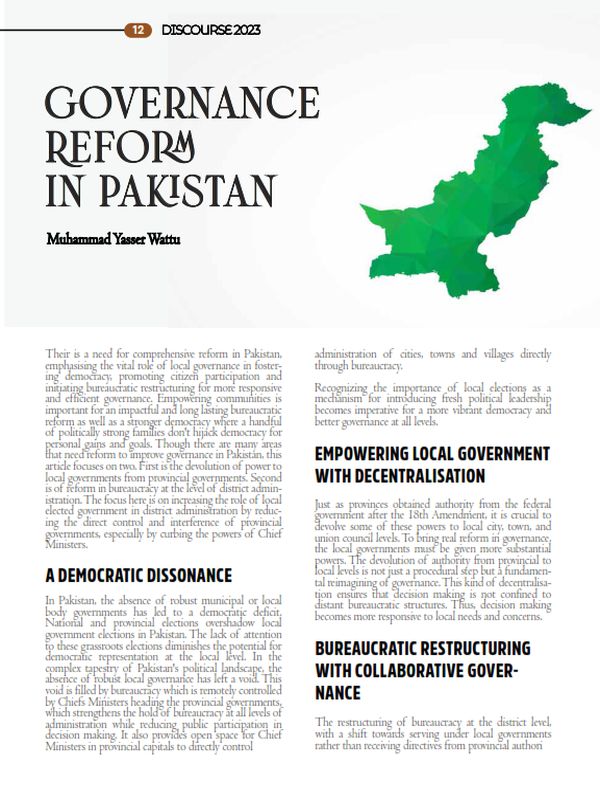Governance Reform in Pakistan
There is a need for comprehensive reform in Pakistan, emphasising the vital role of local governance in fostering democracy, promoting citizen participation and initiating bureaucratic restructuring for more responsive and efficient governance. Empowering communities is important for an impactful and long lasting bureaucratic reform as well as a stronger democracy where a handful of politically strong families don’t hijack democracy for personal gains and goals. Though there are many areas that need reform to improve governance in Pakistan, this article focuses on two. First is the devolution of power to local governments from provincial governments. Second is of reform in bureaucracy at the level of district administration. The focus here is on increasing the role of local elected government in district administration by reducing the direct control and interference of provincial governments, especially by curbing the powers of Chief Ministers.
A Democratic Dissonance
In Pakistan, the absence of robust municipal or local body governments has led to a democratic deficit. National and provincial elections overshadow local government elections in Pakistan. The lack of attention to these grassroots elections diminishes the potential for democratic representation at the local level. In the complex tapestry of Pakistan’s political landscape, the absence of robust local governance has left a void. This void is filled by bureaucracy which is remotely controlled by Chiefs Ministers heading the provincial governments, which strengthens the hold of bureaucracy at all levels of administration while reducing public participation in decision making. It also provides open space for Chief Ministers in provincial capitals to directly control administration of cities, towns and villages directly through bureaucracy.
Recognizing the importance of local elections as a mechanism for introducing fresh political leadership becomes imperative for a more vibrant democracy and better governance at all levels.
Empowering Local Government with Decentralisation
Just as provinces obtained authority from the federal government after the 18th Amendment, it is crucial to devolve some of these powers to local city, town, and union council levels. To bring real reform in governance, the local governments must be given more substantial powers. The devolution of authority from provincial to local levels is not just a procedural step but a fundamental reimagining of governance. This kind of decentralisation ensures that decision making is not confined to distant bureaucratic structures. Thus, decision making becomes more responsive to local needs and concerns.
Bureaucratic Restructuring with Collaborative Governance
The restructuring of bureaucracy at the district level, with a shift towards serving under local governments rather than receiving directives from provincial authorities, would mark a paradigm shift in governance dynamics of Pakistan. Shifting the role of bureaucracy at the district and divisional level, so that it operates under the local government rather than receiving direct orders from provincial authorities, is key to administrative as well as bureaucratic reform. This restructuring fosters a more collaborative relationship between elected local governments and the bureaucracy, eliminating undue interference from provincial governments. This collaborative approach eliminates unnecessary impediments and ensures a more efficient administration.
A vital component of empowering local governments is freeing local administration from undue influence of provincial governments. Chief Ministers should not have unilateral authority to transfer or suspend officers without approval from the local government where these officers are serving. This strengthens local governments and ensures that bureaucratic decisions align with local priorities.
By ensuring a consultative process over transfer and suspension of government officers, the autonomy and effectiveness of local governments are preserved. It also reinforces democracy from the level up to the provincial and federal governments.
Divisional Assemblies for Regional Legislative Empowerment
Another step for reform and devolution is to introduce Divisional Assemblies, with elected representatives from all the districts in that division. The introduction of divisional assemblies can be a very effective move towards decentralising legislative power. Provinces devolve some legislative authority to these regional bodies, fostering a more inclusive decision making process.
Devolution as a Catalyst for Bureaucratic Reform
Devolution serves as a catalyst for comprehensive bureaucratic reform. The archaic bureaucratic structure, reminiscent of colonial times, is in dire need of reform. Devolution of powers from provinces to local and district governments can help overcome the resistance by bureaucracy to the kind of reform that cuts down the colonial style powers our bureaucracy enjoys. Aligning bureaucratic processes with the evolving demands of local governance not only enhances efficiency but also paves the way for a more adaptable and responsive administrative framework.
From Alienation to Inclusion
Devolution fosters a sense of ownership among citizens. In the current governance system, the public often feels excluded from decision-making processes dominated by bureaucratic and political elites. Actively involving citizens in governance fosters a sense of ownership and responsibility. Inclusivity transforms citizens from passive observers to active participants, ensuring a more engaged and responsive populace. This encourages responsibility and a stronger connection between the government and the governed.
Conclusion
In conclusion, restructuring bureaucracy, devolving powers to local and district governments and encouraging civic participation is essential for reform in Pakistan.
The call for reform in Pakistan’s governance structure is a necessity for the evolution of a robust and inclusive democracy. Devolving powers to local governments, restructuring bureaucracy, and encouraging civic participation are key steps toward building a governance system that resonates with the diverse needs and aspirations of Pakistan’s populace. Through these concerted efforts, Pakistan can navigate towards a future where governance is not an exclusive affair but a collaborative endeavor that truly serves the people.
The author is an anthropologist who has worked briefly as a government officer and with NGOs.




